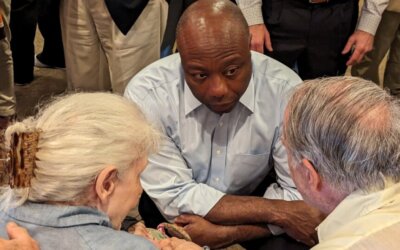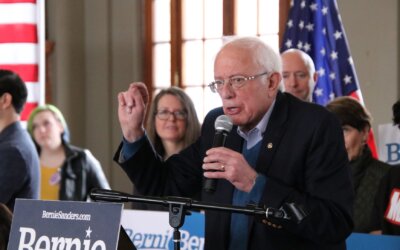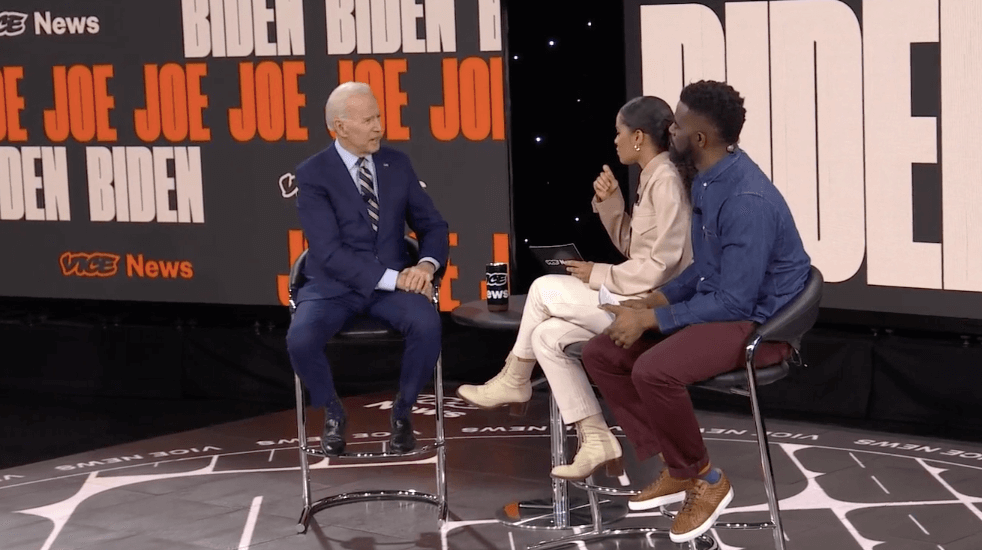
Eight presidential candidates gathered Monday afternoon in Des Moines for the 2020 Iowa Brown & Black Democratic Presidential Forum, a minority-focused event dating back to 1984.
Reporters from Vice News led one-on-one discussions with the candidates as they were asked to explain how their policy proposals would affect American minorities like African Americans, Latinx and Native Americans.
Though they did ask some lighthearted, rapid-fire questions during a “short answer” segment, a majority of the questions were hard-hitting policy probes that forced the Democrats to think about how they would govern as president, and what past decisions on race-related issues said about their potential in the White House.
Here is a breakdown of some of the toughest topics each candidate addressed:
Michael Bennet
Poverty And The $15 Minimum Wage
Most of Colorado Sen. Michael Bennet’s time on stage at the Brown & Black forum was dedicated to discussing his opposition to raising the federal minimum wage to $15 per hour in all localities.
Vice News correspondents questioned the candidate first on the issue, and he was later pressed on the topic by an audience member.
Bennet remained consistent with his lack of support for a federally mandated raise, a policy embraced by most of his competitors for the Democratic nomination. He said Iowans should vote for him because of the comprehensive anti-poverty package he’s proposing, which would “make more of a difference for Americans than raising the minimum wage.”
“I support a $15 minimum wage across the country, except in places where it will drive everybody out of business,” Bennet said, pointing to a city he often refers to when discussing this issue — Marianna, Arkansas, a majority black town located in one of the poorest counties in the country along the Mississippi Delta.
[inline-ad id=”3″]
“There aren’t a ton of those places,” Bennet said. “If you have a $15 minimum wage there, you’re going to drive every single non-profit out of business, every small business out of business, and I don’t want to do that.”
His answer elicited the question of whether businesses should exist that cannot afford to pay employees at least $15 an hour.
Before the minimum wage discussion, Vice questioned him on his overall bid for the White House. They wanted to address the “elephant in the room,” saying that New York Magazine described him as a “bland white guy that you’ve never heard of.”
The moderators then asked why Bennet was still in the race, despite Iowans’ lack of familiarity with him.
“I’ve stayed in the race because I believe that I have a stronger anti-poverty platform than anyone in the race,” Bennet said. “My name recognition has been an issue in my campaign, but the ideas that I’ve been advancing in this campaign will make the biggest difference for the kids living in poverty and if it does make a difference, I will be very glad that I ran.”
[inline-ad id=”4″]
Pete Buttigieg
Race Relations In South Bend, Indiana
Throughout his presidential campaign, Pete Buttigieg, the former mayor of South Bend, Indiana, has faced criticism for his handling of race relations in his hometown.
The moderators pointed to the ouster of South Bend’s first black police chief, which happened while Buttigieg was mayor, and how the number of black police officers shrunk under his tenure. They pressed him to explain his handling of race relations in the city and why he sometimes is perceived as a mayor who did not work well with African Americans in the city.
“This is a painful issue in our city and this is a painful issue in every city,” Buttigieg said. “When we’re dealing with it in our community, it’s not for the luxury of a debate; we’re not debating these things in the abstract, we’re dealing with them. On my watch, in our region, we led the region in transparency on information about what was happening in policing. For example, publishing data on the use of force on an incident level.”
[inline-ad id=”5″]
Vice had a “simple question” for Buttigieg: “There’s fewer black officers working in the department then before you were hired, why was that the case?”
In response, the 38-year-old former mayor pointed to efforts made by his office to reach into the community to get more African Americans interested in a career in law enforcement. But when asked to comment specifically on allegations that he wouldn’t meet with certain officers, Buttigieg said: “I’m not going to get into it case by case. What I am going to say, is that when somebody threatens to sue you, you make sure to talk to a lawyer.”
“I have had countless meetings with officers,” he said, “including officers of color, in my city.”
Andrew Yang
Would $1,000 A Month Cure Racism?
When Vice introduced entrepreneur Andrew Yang, they highlighted the fact that Asian Americans are the fastest growing minority group in the country. They also noted that some white supremacists had said they were supportive of Yang’s campaign.
“How does President Andrew Yang deal with the issue of white supremacy in America?” the moderators asked.
Yang first scoffed at his favorability among the group, questioning why some white supremacists gravitated toward his campaign, and then discussed his plans for making the country more economically fair, which he thought could help curb hate among races.
“Well first, I was stunned to hear that anyone who has any kind of hateful ideology in their hearts would support me — I don’t look like the poster boy for white supremacy. But to me, we have to give Americans a path forward,” Yang said.
[inline-ad id=”0″]
He then said the country needed pathways forward in our communities so people know that “hate is not the answer.” The best way to do this, Yang said, is to put resources directly into communities, by using his Universal Basic Income proposal.
Vice pressed him on the statement, asking if giving out money fixes racism.
Of course not, Yang said, but in an environment of shrinking opportunities, it becomes much easier for Americans to turn on each other.
“There’s a mindset of scarcity that’s taken over our country, because 78% of Americans are living paycheck to paycheck, and half of us can’t even afford a $500 setback,” Yang said. “In that environment, if someone comes to you and says, hey, blame these people, you’re much more likely to listen if they’re unstable about their own future and the future of their children.”
Vice also mentioned that black economists have described his plan as dangerous because the tax that he’s proposing to help implement the UBI could disproportionately hit poor families harder and exacerbate the racial gap in the country.
But Yang said the rich will pay much more into the system.
“The great thing about a value-added tax … is that you can ratchet it up on things like artificial intelligence and yachts and luxury watches, and you can exempt things like diapers and milk and toilet paper,” he said.
[inline-ad id=”1″]
John Delaney
Instead Of Using Your Wealth To Run For President, Why Not Donate It?
John Delaney is one of the wealthier candidates in the presidential race, though not on the level of billionaires Tom Steyer and Michael Bloomberg.
The former Maryland congressman and business owner was challenged on that point by moderators at the minority-focused forum, questioning why he chose to spend millions of his own money — Vice News said $24 million, Delaney said $10 million — on a presidential bid that hasn’t gotten much traction, instead of donating his wealth to charitable causes and communities in need.
“If this presidential run doesn’t work out for you, that money is kind of gone into the ether. Couldn’t you have used that money for something else?” the moderators asked.
Delaney, who often cites his working-class upbringing and the successful company he built from scratch, said, “I don’t think there’s anything that I could do that’s better than trying to fight for the future of our country and engage in this battle of ideas.”
[inline-ad id=”2″]
Delaney said his family has engaged in philanthropy and given back to communities in need, specifically citing a U.S.-Mexico border town he visited with his wife, where 1,700 women and children were detained. They funded a trip to Texas, Delaney said, for law students to help asylum seekers prepare their cases for court.
“I always thought of my life as a third learning, a third earning and a third serving,” he said.
“When I see Saint Peter one day — I hope to see him one day — I don’t want to tell him about my business career, I want to tell him about what I tried to do to make a difference in the world.”
Elizabeth Warren
Is A Plan A Promise?
Sen. Elizabeth Warren has a plan for just about every issue the 2020 Democrats are running on, but Vice asked the Massachusetts politician if she could in fact do it all, and who would suffer if she can’t.
Vice asked Warren if her proposals might be too good to be true, and when she might need to compromise, what would she drop first, especially when it came to the revenue from her two-cent wealth tax.
“This is what I’m out here to do, it’s like a battle plan,” Warren said. “Politically, that wealth tax, you’re right, Dems love it … but Independents love it, Republicans love it.”
[signup_form]
She said her wealth tax is a solid place to start a legislative agenda, but she will need help from the American people to achieve it.
“I’ll do it from the White House, you guys stay organized out here pushing, and we’ll get Congress to be on board,” she said. “Do you think of democracy as too good to be true? What kind of an America do you think this is?”
Vice then expressed concern that historically black colleges and universities (HBCUs) would be the first plan to be dropped if she can’t accomplish all of her proposals. Warren’s plan for HBCUs includes a $50 billion investment.
The moderators noted that while Warren offers solutions to a lot of the problems in low income communities, they sometimes wonder if she’s pandering to satisfy a certain audience.
“I’m not dropping the HBCU plan … It’s a well-crafted plan because I care about it. We need educational opportunities for everyone,” Warren said, leaning on remarks from her stump speech about her past profession as a public school teacher.
[inline-ad id=”6″]
Bernie Sanders
Sweeping Social Programs And Black Americans
“Every time America has passed this huge transformative social program, from Social Security to Obamacare, it’s found some way to screw over black people,” the Vice moderators told Sen. Bernie Sanders. “What are you going to do to make sure that your social programs aren’t watered down in Congress in ways that exclude black Americans?
Sanders, who has banked his presidential campaign on big ideas like universal health care, tuition-free colleges and universities, the Green New Deal and a near “moratorium” on deportations, said his policies would go a long way toward lifting up minorities in America.
“Our plan, if anything, is going to be benefitting the African American community and the Latino community and the Native American community,” Sanders said, pivoting to Medicare for All, the outsized amount of debt black students incur in college, and the devastating impacts of climate change felt in African American, Latinx and Native American communities.
The moderators acknowledged the positive intentions of his proposals, but wondered whether they were too “radical” to defeat President Donald Trump, at a time when a top-of-mind concern for Democratic voters is ousting him in November.
[inline-ad id=”7″]
In particular, they were concerned about his immigration proposals, given that Trump stakes much of his political appeal on demonizing immigrants.
“To answer your question, I happen to believe that Trump will be a very formidable opponent for a large number of reasons, he lies all the time, etc., etc. But, to defeat Trump, we are going to need a very large voter turnout,” Sanders said.
“I think we are well-suited — because of our message and our grassroots activism — we are asking and working hard, spending a whole lot of money reaching out to working class people who have been disillusioned by the political process and normally don’t vote.”
Joe Biden
They Know Me: A Reflection On His Relationship With Black Americans
The moderators largely focused on former Vice President Joe Biden’s past while questioning him on stage, both during his years in the Senate, in the Obama Administration and past remarks on the campaign trail.
And Biden also spent most of his time referring to his past, namely, why his popularity has remained consistent with black voters.
“I’m a United States senator because of the African American community. The African American community turns out in my state every time I run — in the same percentage in an off-year than during a presidential year. If you notice, I have overwhelming support from the community,” he said.
But Vice pushed back, asking why Sen. Sanders was leading him with black voters under the age of 35.
“He is not leading me in black voters under the age of 35. All I know is I’m leading everyone, combined, with black voters,” Biden said. “Let’s get this straight — name anybody who has close to the support I have with the black community.”
[inline-ad id=”8″]
On a personal level, why does the black community like you so much? Vice asked Biden.
“Because they know me. They know I know them and they know I care. From the time I was 16 years old,” he said. “I’ve worked on the East Side. I deliberately went and worked for three years and made sure I was the only white guy. I wanted to understand.”
A number of Vice’s questions pointed to one of the themes of Biden’s campaign — a need to return to a time of bipartisan compromise.
“What do you think that black voters, who say overwhelmingly that Trump’s a racist, what do you think they hear when he [Biden] says he’s open to working with Republicans?” Vice asked.
“Look, the other option is we have eternal war. Democrats and Republicans never cooperate in any way, and we have a constant battle. We’ll get nothing done. For black, white, Hispanic, anybody,” Biden responded. “I believe we can get things done.”
Amy Klobuchar
Defending Her Career As A Local Prosecutor
The Minnesota senator had her record as a prosecutor challenged on stage as the final candidate to answer questions at the Iowa Brown & Black Democratic Presidential Forum.
When California Sen. Kamala Harris, also a former prosecutor, was in the race, she faced similar criticisms of contributing to the nation’s high incarceration rate.
Vice asked Klobuchar why she advocated “for longer prison sentences for non-violent drug dealers, even when the drug courts recommended work release and drug treatment,” a point in her prosecutorial background she pushed back on.
Klobuchar said she contributed to a 12% reduction in African American incarceration while she served as Hennepin County attorney in Minnesota.
“I have learned so much from that job and since I’ve been in the Senate about the persistent institutional racism that we see in the criminal justice system — it is there,” she said.
[inline-ad id=”9″]
The senator cited video-taped interrogations and increased access to body camera footage; racially inclusive staffing in police departments and prosecutor’s offices; improving the practice of eye-witness identification; and criminal sentencing reform as steps she took to improve the system in Minnesota, and further efforts she would pursue as president.
As a prosecutor, Vice said, “you upheld and were on the front lines of the mass incarceration of brown and black people.”
Though Klobuchar defended her record, she also said there are “always cases” to be learned from and improved upon, including her updated view on using grand juries to decide on police shooting incidents, a policy she doesn’t support anymore.
“There’s an example of, prosecutors have to take responsibility for the cases in front of them and make the decisions on the hard calls,” she said.
By Isabella Murray and Elizabeth Meyer
Posted 1/20/20
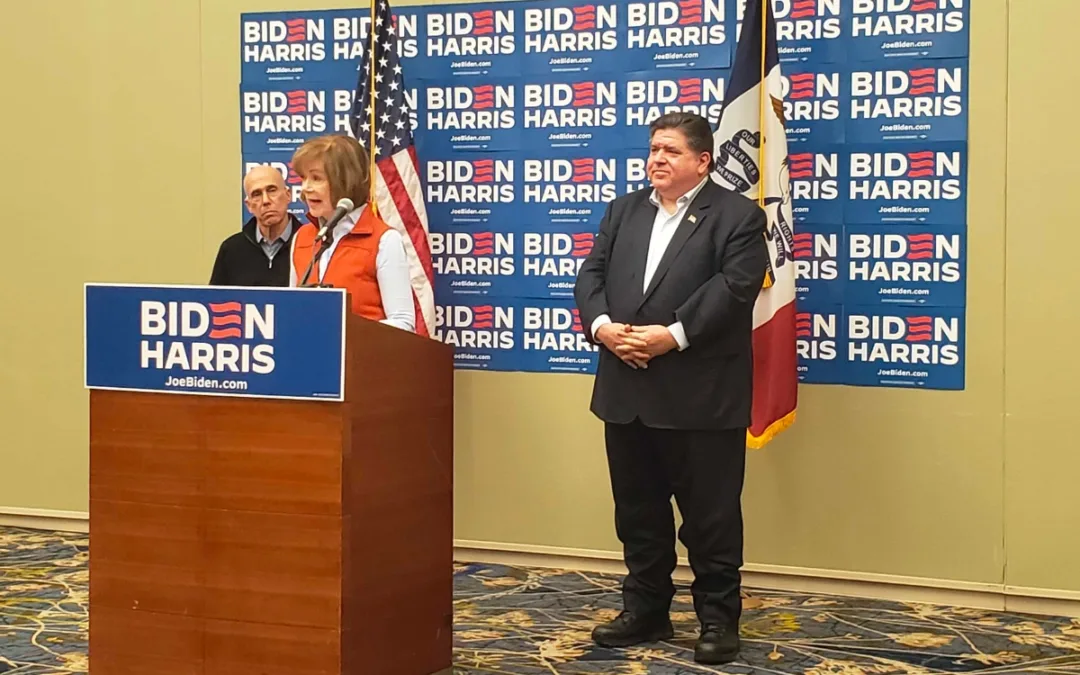
Original, heels or boots: Pritzker says leading Republicans are all MAGA
Illinois Gov. JB Pritzker said all three leading candidates in the Iowa GOP caucus—Donald Trump, Nikki Haley, and Ron DeSantis—represent the same...
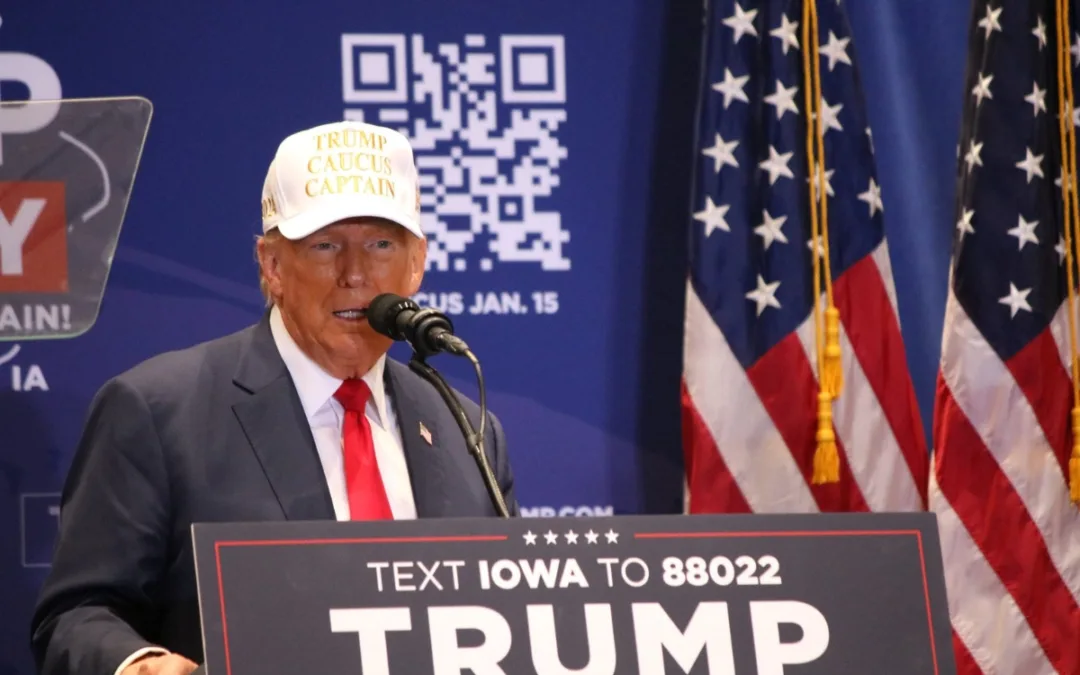
Trump tells supporters it is worth dying to caucus for him
Former President Donald Trump continues to encourage his massive base to turn out in droves for him during Monday’s Republican caucus and told an...

Climate change protesters disrupt Ron DeSantis event
Climate protesters disrupted a Gov. Ron DeSantis campaign event in Ames on Thursday night. Three protesters were escorted out of the room at...

Evangelical leaders predict huge caucus turnout, downplay endorsements
Iowa caucus candidates have racked up big-name endorsements—including a notable last-minute flip flop—but one evangelical leader said none of that...
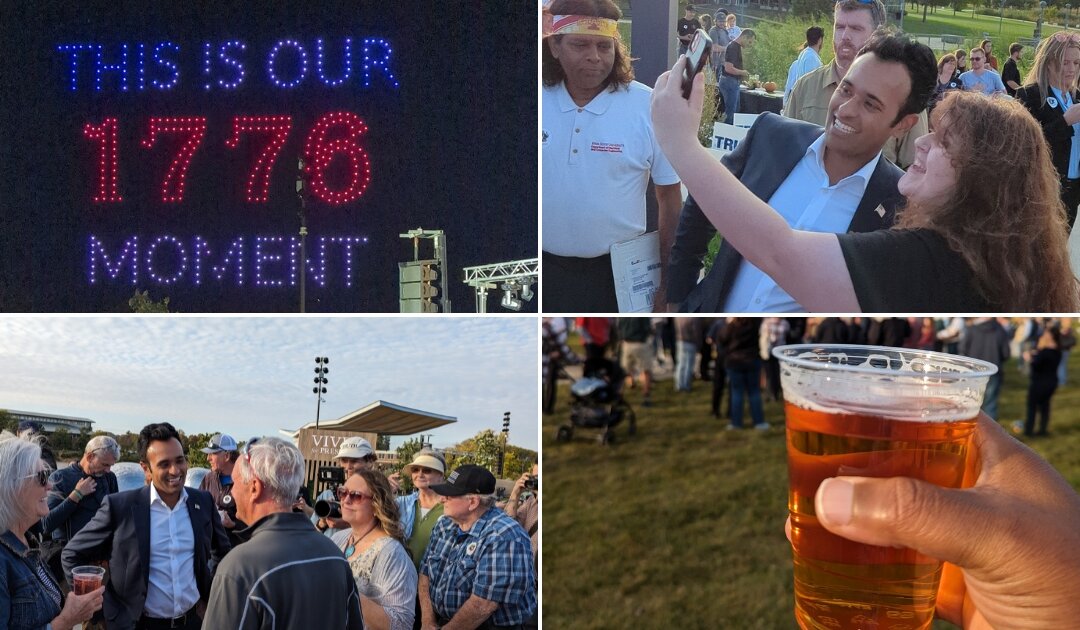
We went to Vivek Ramaswamy’s ‘Vektoberfest.’ Here’s what we saw
As I sat on a park bench eating a bacon-grilled cheese sandwich, drinking an Exile Ruthie straight from the tap, and chit-chatting with a few folks,...
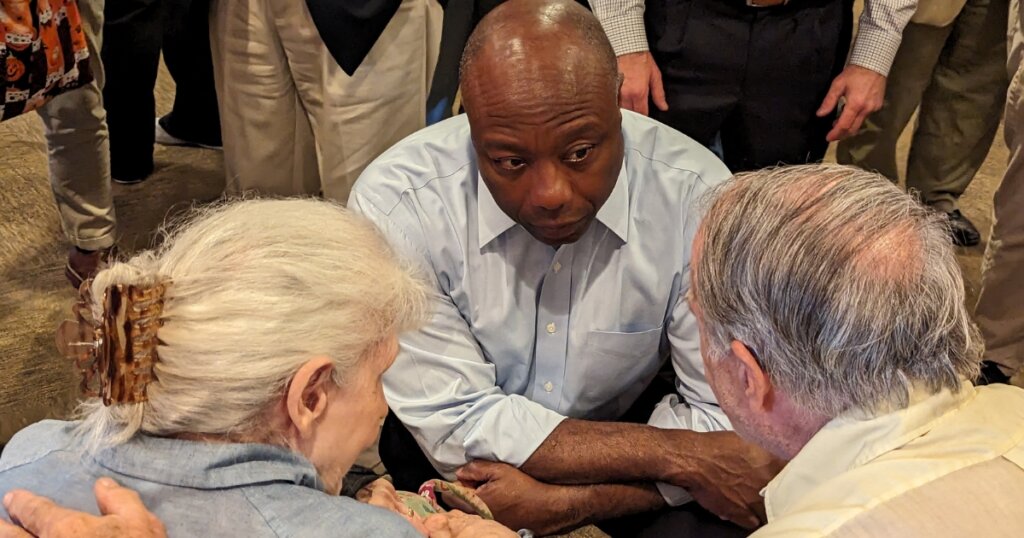
Tim Scott says kids need more exposure to conservatism
While many Republicans across the country have spent the last few years arguing that public schools are being used to indoctrinate kids into leftist...


